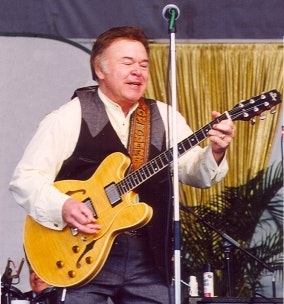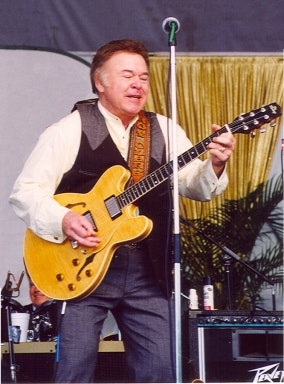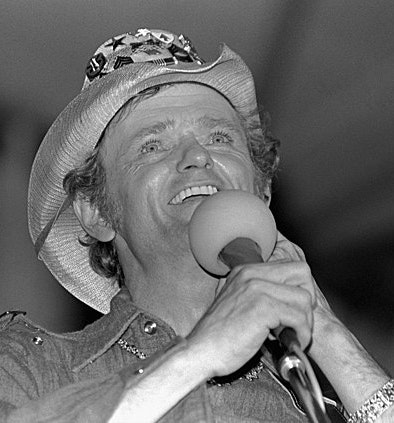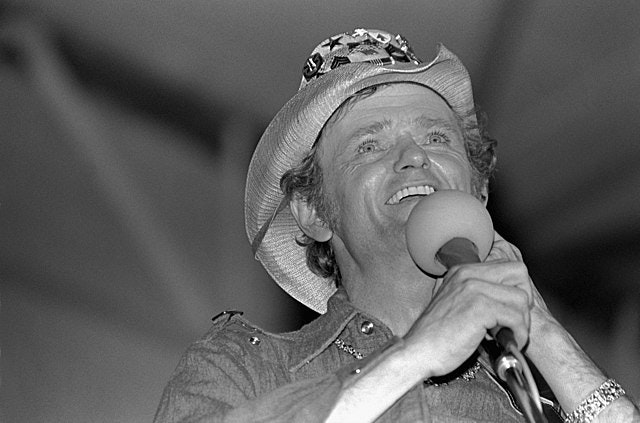Nashville Pickers
By Chris Meiman
Country music and baseball have long been intertwined, but perhaps never more so than in the mid-1970s when a group of Nashville songwriters, musicians and artists joined together to form the Nashville Pickers. What began as a promotional tour featuring some of the biggest names in the industry helped bridge a gap in Nashville baseball history and may have helped bring pro baseball back to Music City.
In 1971, Gene Ferguson, the National Promotion Manager for Columbia Records, came up with the idea for a barnstorming team of country music stars who would play friendly exhibition games against local teams and then stage a concert after the game. The idea would raise money for local charities, usually a local youth baseball organization, and raise the profile of the artists participating. From there, the “Nashville Pickers” (alternately called the “Music City Pickers”) were born.
The Pickers didn’t gain much notice until 1972 when they added former Cincinnati Reds manager and Philadelphia Phillies “Whiz Kids” hero Dick Sisler as their manager. They also recruited former Vanderbilt coach George Archie as a coach and sometimes fill-in player. His connections to Vanderbilt would prove important as the school would often provide opposition to the Pickers.


One more strong addition came in the form of minor league pitcher Jim Cosman, a one-time Nashville high school product. The Pickers also featured plenty of talent from the musical ranks. Hee-Haw’s musical director and harmonica virtuoso Charlie McCoy was an early participant along with rockabilly guitarist Bob Luman, singer Roy Drusky, singer-songwriter Ed Bruce and singer-songwriter Tommy Cash, younger brother of “The Man in Black.”

One of the Pickers first games that season was a contest in Atlanta against a team of celebrities and Atlanta Falcons football players for the Braves’ “Country Music Day.” The game was played at Atlanta Stadium where just two weeks before, Hank Aaron passed Babe Ruth’s career home run mark. A few days later, a team of Vanderbilt University baseball coaches and personalities was the next opponent for the Pickers. Jim Cosman shut out the Commodores with their own coach Larry Schmittou on the mound, 9-0. Later in June, the team from Vanderbilt returned the favor with a 3-0 win over the Pickers.
The following season saw the Pickers become more of a national act with Ferguson marketing the shows to Major League teams as a package deal that allows stadiums to have an entertaining ballgame and concert with top-tier talent as part of the same gate as their own ballgames. Ferguson estimated that they brought an extra 4,000 fans to their Atlanta game in 1972 and with that showing were able to schedule games in St. Louis and Houston for 1973, as well as a return to Atlanta.
The Pickers were able to add some more talent from the Nashville scene, including one of the most famous personalities in country music, Roy Clark (pictured below). Clark, who appeared in millions of living rooms every week as the co-host of Hee-Haw, also had more than a passing interest in baseball. In 1951 he tried out for the St. Louis Browns and later he was the co-owner of the Tulsa Drillers minor league team.


The pickers also added two of the biggest country music singers of the time, “Whisperin’ Bill” Anderson and Jerry Reed. Anderson, who had a string of Top-10 hits going back to the early 1960s, was a star high school pitcher in Georgia but instead decided to pursue a musical career. Reed (pictured below) had a Top-10 pop hit with “When You’re Hot, You’re Hot” and would soon achieve international fame as a sidekick to Burt Reynolds in a string of films in the late 70s. He was also married to Priscilla Mitchell who had a #1 hit duet with Reed’s Pickers teammate Roy Drusky in 1965. Charley Pride, who played professionally in the Negro leagues and the low-minors before hitting it big on the charts, was also an occasional part of the team.


The Pickers wanted to play as many dates as they could beyond the big gigs in MLB stadiums. They inaugurated a local ballfield in nearby Brentwood, Tennessee where a number of country music artists lived, and hoped to embark on a tour of Canada to play teams of NHL players. They even wanted to challenge the White House staff of President Gerald Ford.
In August 1974, the Pickers played a club from Youngstown, Ohio called the “Putt Putt All-Stars” before a crowd of about 4,000 in Nashville. Having a place to play was soon becoming an issue as Nashville did not have a ballpark after the demolition of Sulphur Dell (pictured below) in the 1960s. Gene Ferguson noted to The Tennessean on August 17 that the stadium “has been (a) long-range goal for sometime now,” and went on to say that if the city would offer the land they “(intended) to build the kind of facility that could draw – and accommodate – big league teams for exhibitions.”

On April 24, 1975, representatives from H&B signed a number of players to the equivalent of promotional contracts so they would have their signatures on their Louisville Slugger bats. In the Louisville Slugger bat factory, there are still autograph plugs for Roy Clark, Tommy Cash, Jerry Reed and Jim Owen. While you won’t find their names on the famous Signature Wall, one player whose name you might see is Owen’s brother Greg who had tagged along for a workout and within ten minutes was signed by a scout for the San Diego Padres who was in town to see a Vanderbilt player.
The Pickers had lined up dates in San Diego, Memphis and Chicago for 1975, but there started to be some strains on the team. Dick Sisler returned to home to watch his son Ric, a future New York Yankee draftee, play ball. Jim Cosman, the star pitcher for the Pickers took a job in St. Louis for a waste disposal company and was only able to occasionally take part in games. Many of the musicians also had to balance the demands of touring and recording with the team, leading to an expanding group of artists suiting up on a part-time basis, including stars like Mickey Gilley, Eddy Raven (pictured below) and even teen-aged sensation Tanya Tucker.
By 1976, the Pickers played a date in Memphis and staged a game in Nashville against retired members of the old Nashville Vols minor league team, but they also branched out into softball and competed in a tournament at the annual Country Music Fan Fair. They even played against a team founded by former Picker Bill Anderson. The games were popular and helped draw interest in Fan Fair by becoming the traditional kickoff to the festivities. With the explosion of country music in the 1990s, the Fan Fair softball games became huge and were televised on The Nashville Network and the softball tradition at the festival continued for more than a quarter century.


While the Pickers would fade away, they certainly contributed to the baseball legacy of Nashville. In 1976, former Picker Jerry Reed joined a group formed by Vanderbilt’s baseball coach Larry Schmittou, which also included country music stars Conway Twitty and Cal Smith, to bring professional baseball back to Music City after more than a decade away. Following a plan similar to the one laid out by Gene Ferguson, Schmittou persuaded the Nashville city government to allow the group to build a new ballpark on the site of a city-owned softball complex just outside of downtown.
By 1978, the group opened Herschel Greer Stadium and the Nashville Sounds took the field in the AA-level Southern League. The Sounds were an immediate hit and were soon moved up to the AAA-level in the American Association. A new ballpark on the site of the old Sulphur Dell grounds in downtown Nashville opened in 2015.
Ultimately, the Nashville Pickers were a vehicle for country music artists to play some baseball and raise some money for charity while also raising their own profiles. What they demonstrated to the city and to the country was that charitable games could be fun, and that big-time baseball could work in Nashville.
